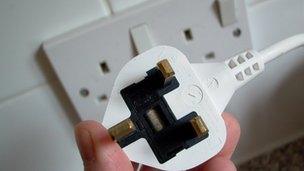Energy chiefs to come under fire from MPs on prices
- Published
Top executives from the UK's six largest energy companies are expected to face serious criticism when they come before a group of MPs.
The bosses have been called in front of the Energy and Climate Change Committee, following recent price rises.
So far, four companies have announced increases that average 9.1%.
The energy firms are expected to insist that the rises were largely due to increasing wholesale prices.
But Andrew Wright, the acting chief executive of regulator Ofgem, is expected to tell the MPs that wholesale prices have risen by less than the rate of inflation.
Ofgem data suggests that wholesale electricity and gas together have risen by just 1.7% over the last year.
It estimates the net effect of wholesale gas prices on a household bill should be just £10 extra on a bill of £600.
Further rises
However, the energy companies are expected to argue that wholesale prices have gone up much faster than Ofgem maintains.
Most companies try to reduce risk by buying wholesale gas on the futures market, a process known as hedging.
Many will buy up to two years in advance.
"If you look at the 24-month figure to October 2013, there has been an 18% rise in the wholesale cost," said a spokesperson for British Gas, the largest energy supplier.
Scottish Power said that wholesale costs had jumped 7% in the last year.
British Gas was also critical of the way in which Ofgem calculates the increases.
"The prices that individual suppliers pay depend on their own hedging strategies, and the Ofgem methodology is, at best, an approximation of what those hedging profiles are," said the spokesperson.
However, Ofgem has admitted that wholesale prices are due to rise significantly this winter.

Ofgem expects wholesale electricity prises to rise 13% this winter
It expects the wholesale price of gas to rise 8%, and electricity to rise 13%, putting further pressure on bills.
Under new Ofgem proposals, the big six energy companies will have to announce exactly how much they pay for wholesale gas or electricity, up to two years in advance.
The companies have also blamed the rising cost of transmission, and green energy levies, for the recent price rises.
Angela Knight, chief executive of the power industry group Energy UK, told BBC Radio 5 Live that energy companies have control of less than a fifth of the costs of energy bills.
"I think the fundamental problem is this: we are on a path in which there needs to be a huge investment in this country in new generation and different types of generation and it costs a lot of money and I don't think it was ever properly explained," she said.
"The costs were never explained, the reason why you've got to make a profit in order to invest huge sums - £11bn last year - and there's more to come."
Transparency
On Monday, Prime Minister David Cameron stressed that he wanted to see further competition between suppliers.
"I'm frustrated about the big six," he said.
"I want to see the big 60; I want to see many more energy companies."
A spokesman for Number 10 added that the energy companies needed to do more to justify price rises.
"It is for the energy companies to explain the decisions they have taken around bills to their customers," he said.
MPs on the Energy Committee will echo those sentiments, by asking companies to explain why consumers are now having to face an average dual-fuel bill of £1,320 a year.
They also want to know how the transparency of their profits can be improved.
In a letter to the committee, Ian Peters, the managing director of energy at British Gas, admitted that there was further work to do on that.
Competition
Labour MP John Robertson will be one of those asking the questions on the Energy and Climate Change Committee. He believes the suppliers should adopt a supermarket-style approach to pricing strategies.
"You have never ever seen an energy company take on the rest of its competitors to try to undercut them," he said.
"That's what I call competition. They don't have competition. When one puts the price up, they all put the price up."
Later this week, Energy Secretary Ed Davey is expected to set out further details of the annual competition test for the energy market.
The review will be carried out by Ofgem in conjunction with the Office of Fair Trading (OFT) and the new Competition and Markets Authority (CMA).
The government has also said it will look at the contribution made to energy bills by the green levies, although these make up a relatively small part of overall costs.